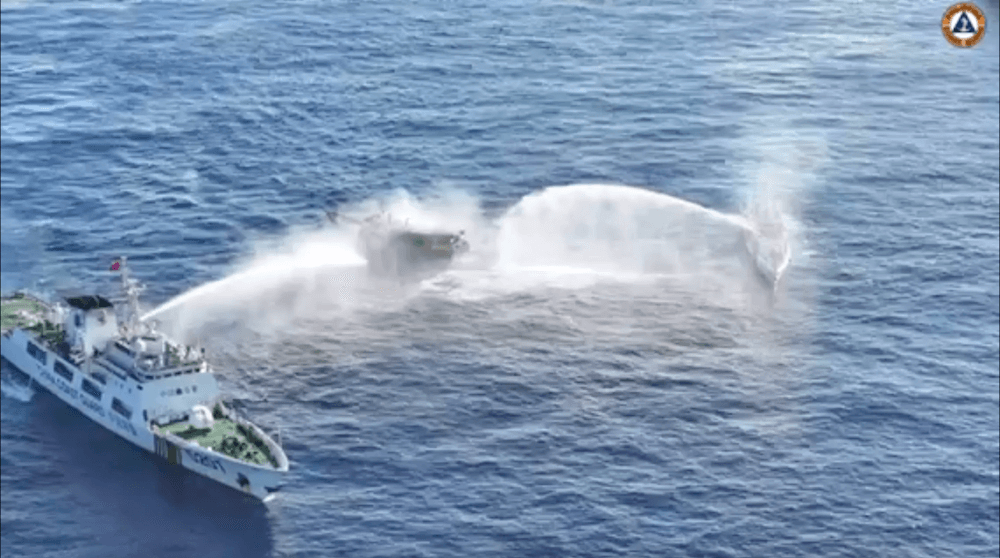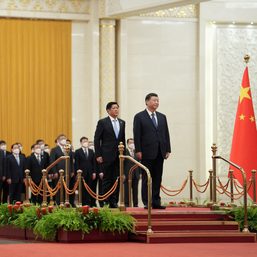SUMMARY
This is AI generated summarization, which may have errors. For context, always refer to the full article.

MANILA, Philippines – On Maundy Thursday, March 28, as Catholics all over the Philippines were practicing their penance and braving the unforgiving heat of the dry season, President Ferdinand Marcos Jr. announced “a response and countermeasure package” given China’s “attacks” in the West Philippine Sea.
“We seek no conflict with any nation, more so nations that purport and claim to be our friends but we will not be cowed into silence, submission, or subservience,” said the Philippine President in his statement.
A week prior, Marcos also signed Executive Order 57, which renamed and reorganized the National Coast Watch Council (NCWC) into the National Maritime Council (NMC). The same EO created the Presidential Office for Maritime Concerns.
A key difference between the NCWC and the new NMC is the inclusion of the National Security Adviser as the representative of the National Security Council, the Solicitor General, and the National Intelligence Coordinating Agency. The National Security Adviser, retired military chief Eduardo Año, is also the chairperson of the National Task Force for the West Philippine Sea.
The restructuring, in effect, strengthens a council that was created by the late former president, Benigno Aquino III.
Different leaders, same situation
Aquino and Marcos couldn’t be any more different. The late Aquino was the son of democracy icons who led the painful re-establishment of democracy in the Philippines. The current president is the son and namesake of the dictator whose horrible regime Aquino’s parents fought against.
Yet, as chief occupants of Malacañang nearly a decade apart, they find themselves in the same situation when it comes to dealing with our superpower Asian neighbor. How can Manila manage Beijing’s bullying in the South China Sea – particularly in the West Philippine Sea, where Filipino should be able to exercise their sovereign rights?
It was under Aquino that Manila took Beijing to court – a case that was decided on in 2016, just as Rodrigo Duterte promised a “pivot” to China. Many expected Marcos to continue Duterte’s pro-China policy (Who could blame them? The candidate Bongbong was painfully vague about his plans in 2022) but two years in, he’s done the exact opposite: bring Manila closer to Washington and other partners.
Marcos flexed the defense and security ties he’s built on and cultivated in his March 28 statement.
“I have also been in constant communication with representatives of relevant allies, partners, and friends in the international community. They have offered to help us on what the Philippines requires to protect and secure our Sovereignty, sovereign rights, and jurisdiction while ensuring peace and stability in the Indo-Pacific,” said the President.
He added: “I have given them our requirements and we have been assured that they will be addressed.”
What will these countermeasures entail? Defense officials are understandably tight-lipped. Military officers have also yet to expound on these measures, and frankly, we don’t expect them to.
But remember the “new” National Maritime Council and the mention of “representatives of relevant allies, partners, and friends in the international community” in the aftermath of what is possibly the worst Chinese attack in the West Philippine Sea to date.
The March 23 resupply mission to the BRP Sierra Madre in Ayungin Shoal left the Unaizah May 4 worse for wear. The China Coast Guard’s water cannons injured three Navy personnel, including one soldier whose body was thrown against the wooden walls of the Unaizah May 4 from the impact of the water cannons.
An earlier mission on March 5, during which the Unaizah May 4’s wind shield was shattered, only saw one supply ship (the Unaizah May 1) making it to BRP Sierra Madre. On March 23, the Navy was able to rotate troops and bring only “essential supplies” via rubber boat to the grounded World War II ship.
Ayungin Shoal is an important feature; nearby is Recto Bank, believed to be bountiful in gas and oil deposits. It’s also crucial for the Philippines to maintain control of it because of how close Mischief Reef is to the Philippine mainland.
Broken promises
When China talks about the West Philippine Sea, they always bring up a couple of things: that it is theirs (it is not) and that the Philippines has failed to fulfill its promises. There are at least two promises that Manila has supposedly reneged on: a promise to tow the BRP Sierra Madre from Ayungin Shoal (who made that promise and when it was made, nobody can or is willing to say) and a promise not to bring construction supplies to the BRP Sierra Madre so no harassment would befall Filipino sailors.
Marcos has already denied the existence of a tow promise and said that if any agreement does exist, he officially rescinds it.
The second promise was apparently made under then-president Rodrigo Duterte. Rappler’s community head Pia Ranada, then Malacañang reporter, reported China’s promise “not to block the Philippine military’s delivery of food and humanitarian supplies”
“China, however, draws the line when it comes to delivery of construction supplies to Ayungin Shoal. Fearing Philippine construction of a lighthouse or similar structure, Chinese officials have said they will react to the sending of these types of materials,” reads her August 2019 report, summarizing West Philippine Sea deals brokered under Duterte.
But Manila can’t seem to find any documentation of this promise, and neither has Beijing produced evidence.
Retired associate justice Antonio Carpio, among the country’s foremost experts on the West Philippine Sea, said that the supposed Duterte-era deal was “lopsided” and a “disguised surrendered” of the Philippines’ sovereign rights over Ayungin Shoal, a low-tide elevation.
“Duterte knew that without repairs the BRP Sierra Madre would collapse and thus end our presence in Ayungin Shoal…. Duterte’s ‘gentlemen’s agreement’ was lopsided in favor of China which under the Arbitral Award had no right to erect any structure on Ayungin Shoal and had no right to stop the Phil from erecting any structure on Ayungin Shoal, much less any right to stop the Philippines from repairing the Sierra Madre,” he said.
Besides, as another West Philippine Sea expert, Jay Batongbacal pointed out, China has no moral ascendancy in insisting on keeping promises. Back in the late 90s, Beijing wrote that its construction in Mischief Reef was just a fisherman’s shelter. It was not, and it rapidly turned into a military outpost.
The developments in Mischief Reef is why the BRP Sierra Madre was run aground in the first place.
If a few weeks ago, the Department of Foreign Affairs (DFA) seethed over the Chinese Embassy’s anonymous disclosure of confidential discussions to media, Beijing has been seething everywhere, everything, at all once it seems.
It lashed out too against… the Philippine media. This is nothing new. China has also bristled over the presence of journalists during Philippine missions to another feature, Bajo de Masinloc.
Three organizations – the Foreign Correspondents Association of the Philippines, the National Union of Journalists of the Philippines and the Defense Press Corps – issued separate statements denouncing China’s ministry of foreign affairs and its embassy in Manila.
Beijing has also been busy fuming at Seoul after its Foreign Ministry’s spokesperson Lim Soo-suk said they were “gravely concerned about the recent and repeated use of water cannons in the South China Sea” in a March 26 briefing.
“We are gravely concerned about the recent and repeated use of water cannons in the South China Sea,” Seoul’s foreign ministry spokesperson, Lim Soo-suk, told a briefing.
“The ROK is not a party to the South China Sea issue. What the ROK has done lately does not contribute to peace and stability in the South China Sea, still less to China-ROK relations. We urge the ROK to stay prudent when it comes to the South China Sea issue,” said China’s ministry of foreign affairs spokesperson Lin Jian, in a March 28 briefing.
South Korea is among the countries that have only recently expressed support for the Philippines and concern over China’s actions in the South China Sea.
Another major country in the Indo-Pacific, India, also recently reiterated support for the Philippines. During a quick visit to Manila, India’s Foreign Minister S. Jaishankar emphasized the importance of adherence to the “rules based order” as well as the United Nations Convention on the Law of the Sea.
“We are convinced that the progress and prosperity of this region Is best served by staunch adherence to a rules-based order, the UNCLOS. It is particularly important in that regard as it is the constitution of the seas. All parties must adhere to it in its entirety both in letter and in spirit,” said Jaishankar.
Of course, Beijing is sure to seethe over the upcoming leaders’ trilateral meeting between the US, Japan, and the Philippines in Washington, DC. Politico is reporting that a joint sail in the South China is in the works for the three countries. – Rappler.com
1 comment
How does this make you feel?
![[EDITORIAL] Filipino journalists to China: Yes, we are trouble](https://www.rappler.com/tachyon/2024/04/animated-wps-march-tension-2024-carousel.jpg?fit=449%2C449)






![[Just Saying] SONA 2024: Some disturbing points](https://www.rappler.com/tachyon/2024/07/TL-marcos-sona-points-july-23-2024.jpg?resize=257%2C257&crop=335px%2C0px%2C720px%2C720px)

I agree: “What will these countermeasures entail? Defense officials are understandably tight-lipped. Military officers have also yet to expound on these measures, and frankly, we don’t expect them to.” Even if this is against the Principle of Transparency, National Security should take precedence at this point in time. I hope that PBBM has checked the loyalty of each National Maritime Council (NMC) member and the Presidential Office for Maritime Concerns. We know there are many pro-China government officials, even though some are silent about it and some deny it, too. Perhaps the Office of the Vice-President and the Senate are offices to look into.